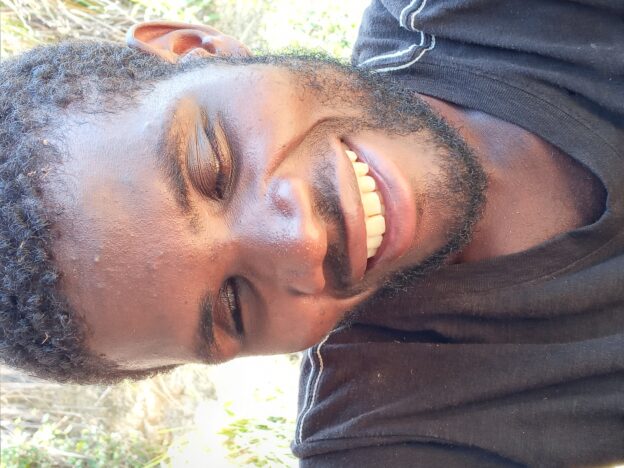I wrote about Yves Révot at the end of 2016. (See here.) When he joined the CLM pilot program for persons with disabilities, he was often going hungry. He’s a farmer who lives in Pouli, an area along the river that eventually runs through downtown Laskawobas, but he has been blind for years due to untreated glaucoma. He was living alone in a deteriorating shack that belonged to his father. Though he was surrounded by his family, they did not see him as important. “When you have no hope, people don’t value you.”
Yves chose two kinds of livestock as the enterprises he would develop. Fonkoze gave him two goats and a pig. He saved as much as he could from his weekly cash stipend and invested it in his farming. For the first time, he could rent land and farm it himself, rather than just working for other people, and his hard work helped him prosper. His livestock holdings grew, he repaired the shack he lived in, and he rented additional land. When Yves completed the program, he easily met Fonkoze’s standard graduation criteria.
The last couple of years, however, have been challenging for Yves. His business model began to fail. He still owned no farmland of his own, and each year he would sell offspring from among his livestock to rent land. He’d work the land and use the crops both for his own nourishment and to bring in cash income. But his crops have failed the last two years because of drought.
His home region, in the valley that reaches from the Dominican border, across the Lower Central Plateau, and towards the sea, is one of the more fertile, less drought-stricken regions of Haiti. But the rains even there have become less and less predictable. When they come at all, they come at moments you would not expect them, too late or too early to do his crops any good. The investment he made in the standard crops of corn and beans were lost. “If I had least been able buy a chicken out of my profits, I’d wouldn’t have been so discouraged.”
At the same time, his success with livestock allowed him to take a major step forward. Last year, he sold a cow and a pig and bought his own plot of land, just downhill from the house he lives in. He’s been planting his new land, but not with corn or beans. Instead, he has planted viv. In Creole, that signifies a range of starches. Mostly roots, like yams, malanga, manioc, and sweet potatoes, but also plantain. He finds them less vulnerable to the irregular timing of rainfall.
So, Yves changed his strategy. “I am not going to sell livestock to rent land any more. “You sell a goat and you can’t be sure you’ll get anything back.” He’ll still rent land when he has the cash to do so. “I can rent, but the money will need to come out of what my farming earns.”
When he shows me his land, he also explains his plan for it. He points out where he’ll put the pig pen and the goat pen, which part he will continue to farm, and, very importantly, where he will build his house. He has made himself comfortable in the family house he repaired while he was in the CLM program. He once sold a pig to buy his first bed. But he eventually wants to move into a home of his own. He has two female goats that he will use to rebuild his stock. And he has a small sow that he hopes to use to build the house.
When you visit Yves, he does not seem much like the poor, isolated young man he was when he joined the program. There is a constant back and forth in his yard: his siblings and other family members start coming by to see him as soon as he returns from the fields. They are bringing him something or coming by to ask a favor. Or just to hang around. He has no trouble getting help from boys when he wants to offer me coconut water. He can climb the tree, but they collect the coconuts he throws down, and they open them with a machete. He now has a status in the lakou, the yard that includes the collection of houses his family lives in, that allows him to assign chores. He is an important part of the family in a way that he had never hoped to be.
